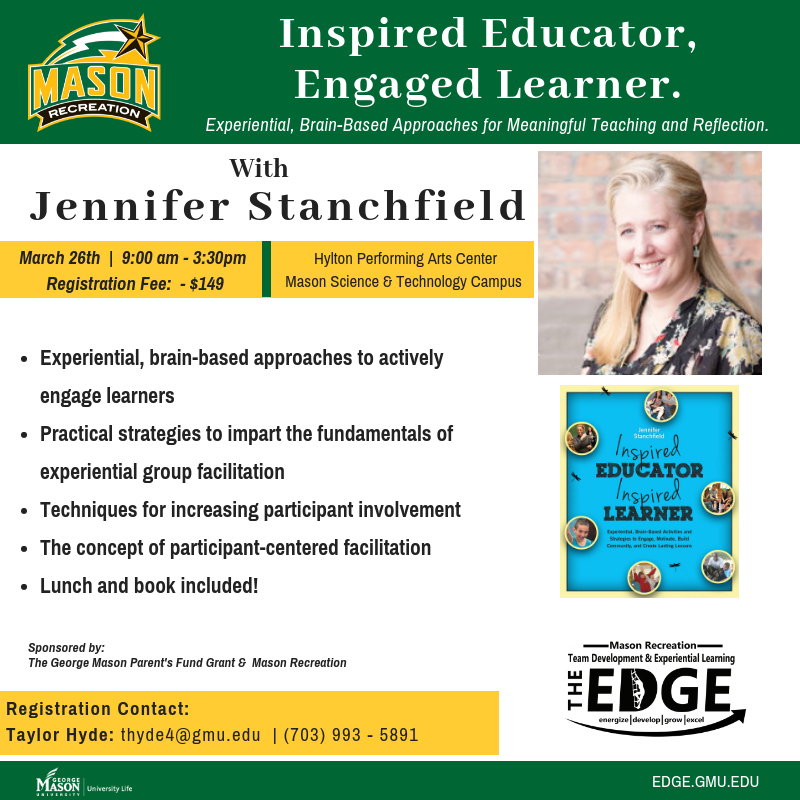Welcome to the Whale Watch! In a minute—but not yet—all of you will be asked to board our boat. Once on, your challenge is to balance it long enough to sing the lyrics to “Row, Row, Row Your Boat” in unison…Welcome to our Zen Garden! Your goal as a team is to keep your group’s yoga mat balanced. Before anyone enters your yoga mat, you need to develop a plan and set a time goal for how long you will keep it balanced.
Wait, what? A boat and a whale watch in the middle of the woods in Prince William County? A giant yoga mat? A stretch of the imagination transforms a giant teeter-totter into a boat, a yoga mat, or a completely different object. The name of the activity is simply a frame, or metaphor, for the challenge the team is being asked to take on. The underlying themes stay the same, however. First, the team works together to solve a problem. Second, they are developing skills in the social, emotional, and cognitive domains that transfer to other spheres of their lives, such as school, athletics, or work.
For our younger participants, we focus on reinforcing skills they need for school success in those three domains. As such, we have four tools we share with the students at the start of the day and revisit them throughout the program. These tools, The Four Ps: Plan; Practice; Patience; and Perseverance, have been part of George Mason University’s Team Development and Experiential Learning program for several decades. Examined through the lenses of Socio-Emotional Learning (SEL) and Bloom’s Revised Taxonomy of Learning (BT), The Four Ps are closely linked to positive growth academically and socio-emotionally.
Plan: Developing and presenting a plan is a requirement for many of the activities we do at The EDGE. Many teams realize that having a plan and revising it throughout the challenge is a key to their success.
SEL: Skills essential to effective planning include active listening; sharing and evaluating ideas; recognizing strengths; self-discipline; motivation; goal setting; and organization.
BT: To plan is the highest order of BT’s Cognitive Domain, Create. When we ask our participants to develop a plan, they are also activating the lower domains as well: They need to remember the rules, understand the goal, and apply the rules and goal to the plan. When we reflect on the activity, they revisit apply when they compare and contrast the effectiveness of the plan and transfer those learnings to new situations such as group projects in school. Finally, they activate the remaining two domains, analyze and evaluate.
Practice: None of the activities and initiatives are easy to accomplish. As such, teams may spend 30 minutes in achieving their goal. Repeated attempts are necessary, with the team building their physical, socio-emotional, and cognitive skills through each attempt.
SEL: When individuals and teams practice skills for improvement, they are also building self-awareness in terms of what their body is doing in time and space, and what they are feeling internally. They become more aware of whether they are contributing positively toward the
team. They are considering whether their strategy is the best one for every team member and communicating those thoughts to team members.
BT: Participants are able to list the skills necessary for successful practice and implement those skills while solving the problem. Through active experimentation they discuss and practice a number of strategies and construct a process that enables the team to be successful.
Patience: This skill is essential when an individual, as part of a team, is working hard toward a goal and is trying to keep a positive attitude. Feelings of frustration can lead to misunderstandings and inhibit the desire to work with certain team members.
SEL: Participants identify their feelings as they work through a challenge, and are challenged with managing their levels of stress and self-discipline. They reflect on how others are feeling, and develop empathy and the ability to take others’ perspectives when reflecting on the challenge.
BT: Patience is reflected in both the Affective and Cognitive Domains. The participants cooperate in the activity, and discuss how they can work through negative feelings like frustration. They are able to describe the impact of impatience on the team’s ability to succeed, and value patience as an essential skill for team building.
Perseverance: Perseverance is a key characteristic of a growth mindset, and focuses on achievement through effort. Carol Dweck, PhD, author of Mindset: The New Psychology of Success, states that “no matter what your ability is, effort is what ignites that ability and turns it into accomplishment.” (2016, p. 41).
SEL: Participants focus on accurate self-perception in terms of internal energy and focus. They work on self-motivation for the good of the group, contribute to the team effort, and evaluate how the team is doing toward achieving the goal.
BT: The individual and the team value achieving the goal, and are committed to seeing it through. They support each other physically, cognitively and emotionally. They defend their rationale for striving to achieve the group goal, and experiment with different techniques.
The Four Ps foster the development of skills that are proven to improve academic performance, positive attitudes toward themselves and others, and decrease levels of emotional distress. Our post-program survey results show that participants practice effective communication and decision-making strategies; increase trust in their team members; increase self-awareness; and gain an understanding of the value of different perspectives. Testimony from repeat clients reveals long-term behavior change as a direct result of their students’ experiences at The EDGE. Come see for yourself!


